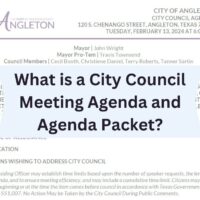Local Government Basics: what is a City Council Meeting Agenda and why is it in a Packet?

Local government directly affects our everyday lives. City ordinances, which are adopted in city council meetings, are the local laws that directly impact the residents of cities and towns across Texas and are created by elected officials. In Texas, state law provides the authority for smaller cities to self-govern by ordinance [1], and for cities with more than 5,000 residents, home-rule governance is authorized by the Texas Constitution. To become an elected official, (mayor or councilmember), residency is required. In order to be eligible to run for an elected public official position in cities you must have resided in Texas for an uninterrupted 12 months, and in the city you run in for six months preceding the date of the filing deadline for an application for a place on the local ballot. Texas Election Code §1.005(9); §141.001(a)(5)(B).
The governing body of a city/town/village is comprised of elected officials, and they conduct municipal business in public meetings. The meetings are predominantly known as city council meetings and state law dictates how the meetings are run. The Texas Open Meetings Act, Texas Government Code Chapter 551, sets out the requirements necessary to establish open government, and the requirement that meetings are accessible by the public. Efficient meetings should be orderly, and to achieve order, a meeting agenda must be created and published by posting (physically and electronically) at least 72 hours prior to the meeting, except in emergencies. Texas Government Code § 551.045. Cities follow and may formally adopt Robert’s Rules of Order, which generally are the principles of parliamentary procedure that dictate: everyone has the right to (a) participate in discussion if they wish, before anyone may speak a second time; (b) everyone has the right to know what is going on at all times; and (c) only one thing (motion) can be discussed at a time.
The meeting agenda sets out the items to be discussed, and possibly acted upon by a vote of the members of the governing body. The definition of the word “agenda” is a list of items to be discussed at a formal meeting. The “agenda” consists of a list of business items and the “packet” or “agenda packet” consists of all of the documents to support the agenda items listed. Packet items may include proposed ordinances, resolutions, agreements, city contracts, city policies, engineering reports and the necessary documents to support city government processes, city hall activities, functions, employment matters, and private and commercial land development in the city. The packet may be paper or electronic and there are no Texas laws that address meeting agenda preparation. Cities may adopt written policies regarding agenda preparation, and home rule city charters may dictate agenda preparation. In fact, in writing this blog I struggled to find any jurisdiction in the United States that defines the “packet” or “agenda packet”. [I hear you thinking “challenge accepted”.]
Guidelines for adopting policies regarding agendas and packets are not statutory, however, there are a few Texas Attorney General opinions that provide that any policies pertaining to agenda creation may not preclude any elected official from placing items on an agenda. In most cities, either the Mayor or the Mayor’s designee or the city secretary is responsible for preparing and posting the agenda and packet for meetings.
Please do not rely on this article as legal advice. We can tell you what the law is, but until we know the facts of your given situation, we cannot provide legal guidance. This website is for informational purposes and not for the purposes of providing legal advice.
[1] Chapter 52 Local Government Code for Type A cities, Chapter 54 for Enforcement Authority, Texas Constitution Article XI, Section 5 grants power of self-government to a Texas home rule city.
